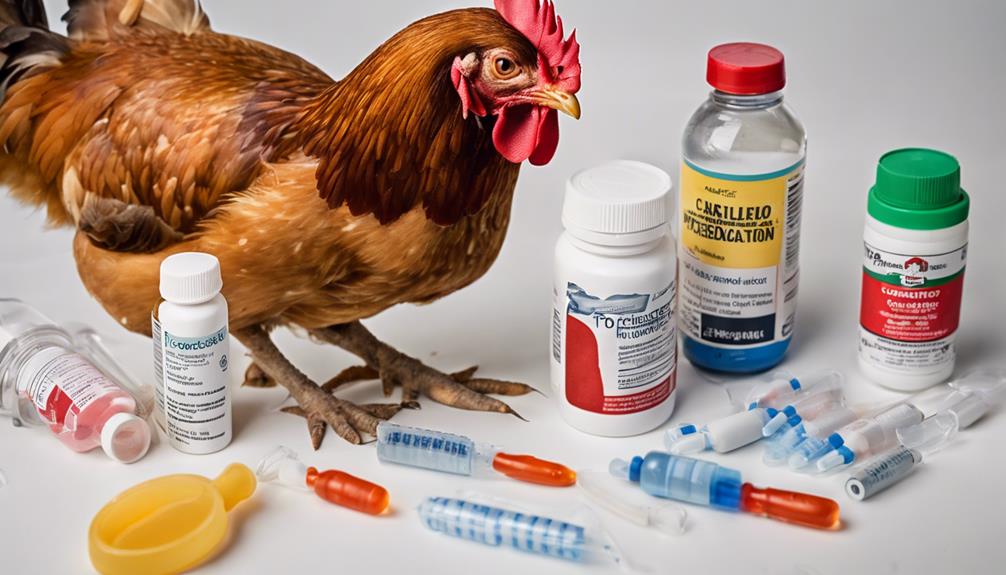Top 10 Preventive Medications for Chicken Diseases"
To protect your chickens, consider these top preventive medications: Marek's Disease Vaccine for advanced prevention. Newcastle Disease Vaccine for vital immune stimulation. Avian Influenza Vaccine reduces severity. Infectious Bronchitis Vaccine stops disease spread. Infectious Bursal Disease Vaccine for young chicks. Fowl Pox Vaccine for disease prevalence control. Infectious Coryza Medication includes antibiotics and probiotics. Coccidiosis Preventive Treatment uses coccidiostats. Salmonella Control Medication enhances food safety. Infectious Laryngotracheitis Vaccine averts ILT spread. Understanding these medications is crucial for your flock's health and well-being.
Marek's Disease Vaccine
To protect your chickens from Marek's disease, vaccination is crucial. The Marek's disease vaccine has shown high efficacy in preventing this deadly disease in poultry. When administered correctly, this vaccine can significantly reduce the risk of your flock contracting Marek's disease. However, as with any vaccine, there may be some side effects to be aware of. These can include mild symptoms such as temporary lethargy or decreased egg production, but these are typically short-lived and outweighed by the benefits of vaccination.
One of the key Marek's disease prevention strategies is to ensure that all your chickens are vaccinated at the appropriate age. Typically, vaccination is recommended within the first day of life or shortly thereafter. By following the recommended vaccination schedule, you can help build a strong immune response in your flock against Marek's disease. Additionally, maintaining good biosecurity practices on your farm, such as controlling wild bird populations and limiting exposure to other poultry flocks, can further reduce the risk of disease transmission.
Newcastle Disease Vaccine
The Newcastle Disease vaccine is essential for safeguarding your chickens against this highly contagious viral infection. It's crucial to understand the vaccine efficacy and disease transmission dynamics to effectively protect your flock. Newcastle Disease is caused by a paramyxovirus, affecting various bird species worldwide. The virus spreads rapidly through direct contact with infected birds, contaminated surfaces, and respiratory secretions.
Vaccination is the most effective way to prevent Newcastle Disease outbreaks in your poultry. The vaccine works by stimulating the chicken's immune system to produce antibodies that provide protection against the virus. Proper vaccination not only safeguards individual birds but also helps in preventing the disease from spreading within the flock.
Vaccine efficacy is influenced by various factors, including the vaccination schedule, vaccine quality, and the health status of the chickens. It's crucial to follow the recommended vaccination protocols to ensure maximum protection. Understanding the disease transmission dynamics is equally important. By implementing biosecurity measures and vaccinating all susceptible birds, you can reduce the risk of Newcastle Disease introduction and transmission on your farm.
Avian Influenza Vaccine
In safeguarding your poultry against avian influenza, utilizing the avian influenza vaccine is imperative for preventing outbreaks and ensuring the health of your flock. Avian influenza, also known as bird flu, can have devastating effects on poultry populations.
Here are some key points to consider about avian influenza vaccines:
- Prevention Strategies: Avian influenza prevention strategies often revolve around vaccination as a primary defense mechanism. By vaccinating your poultry, you can significantly reduce the risk of your flock contracting the virus. Additionally, implementing biosecurity measures, such as restricting access to your farm and disinfecting equipment, can complement the efficacy of the vaccine.
- Efficacy of Avian Influenza Vaccines: Avian influenza vaccines have shown to be effective in reducing the severity of the disease and minimizing transmission among birds. These vaccines are designed to stimulate the immune system of the poultry, preparing them to fight off the virus if they're exposed.
- Timing of Vaccination: It's crucial to adhere to the recommended vaccination schedule for avian influenza to ensure optimal protection. Vaccinating your poultry at the right time and with the correct dosage is essential for maximizing the vaccine's effectiveness.
- Consultation with a Veterinarian: Prior to vaccinating your flock against avian influenza, consulting with a veterinarian is advised. They can provide guidance on the most suitable vaccine for your specific circumstances and ensure proper administration for the best results.
Infectious Bronchitis Vaccine
Utilizing the Infectious Bronchitis vaccine is crucial in safeguarding your poultry against this highly contagious respiratory disease. The vaccine is highly effective in preventing the spread of Infectious Bronchitis virus within your flock. When administered correctly, the vaccine can significantly reduce the incidence and severity of the disease among your chickens.
The effectiveness of the vaccine largely depends on proper administration. It's essential to follow the recommended administration protocol and timing. The vaccine is typically administered to chicks through drinking water or by spray vaccination. It's crucial to vaccinate your poultry at the appropriate age to ensure maximum protection. Consult with a veterinarian to establish the most suitable vaccination schedule for your flock.
While the Infectious Bronchitis vaccine is generally safe, like any vaccine, it may have some side effects. Chickens may experience mild reactions such as swelling at the injection site or a slight drop in egg production. These side effects are typically temporary and resolve on their own. However, it's important to monitor your flock post-vaccination and consult a veterinarian if you notice any concerning symptoms.
Infectious Bursal Disease Vaccine
To effectively protect your poultry against Infectious Bursal Disease, consider implementing the recommended vaccination protocol for this highly contagious poultry ailment. Infectious Bursal Disease (IBD), also known as Gumboro disease, can cause severe immunosuppression in chickens, making them more susceptible to other infections.
Here are some key points to consider for Bursal disease prevention strategies and vaccination schedules for infectious bursal disease:
- Timing of Vaccination: Vaccination against Infectious Bursal Disease should be carried out in young chicks, preferably between 14 to 21 days of age. This timing ensures that the chicks develop immunity before being exposed to the virus.
- Types of Vaccines: There are live and inactivated vaccines available for IBD. Live vaccines provide better immunity but can revert to virulence, while inactivated vaccines are safer but require boosters for prolonged immunity.
- Vaccination Administration: Ensure proper administration of the vaccine following manufacturer recommendations. Vaccines can be administered via drinking water, spray, or injection, with each method having specific protocols for optimal effectiveness.
- Monitoring and Revaccination: Monitor the flock post-vaccination for any signs of disease. In cases of high viral pressure, revaccination may be necessary to maintain protective immunity levels. Regularly review and adjust your vaccination schedule based on the disease prevalence in your region.
Fowl Pox Vaccine
Consider incorporating the Fowl Pox vaccine into your poultry health management regimen to safeguard your flock against this viral disease. Fowl pox is a highly contagious viral infection that can have a significant impact on your poultry. Implementing fowl pox prevention strategies, including a vaccination schedule, is crucial to maintaining the health and productivity of your birds.
The Fowl Pox vaccine plays a vital role in building immunity against the disease. Vaccination not only protects individual birds but also contributes to herd health management by reducing the overall prevalence of fowl pox within the flock. By ensuring that all birds receive the vaccine according to the recommended schedule, you can create a strong immunological barrier that minimizes the risk of disease transmission.
When it comes to fowl pox prevention, consistency is key. Make sure to follow the vaccination schedule provided by your veterinarian or poultry health expert. This will help maintain a high level of fowl pox immunity in your flock, ultimately leading to better overall health and well-being for your birds.
Incorporating the Fowl Pox vaccine into your preventive health measures is a proactive approach to safeguarding your poultry against this debilitating disease. Prioritizing vaccination as part of your herd health management plan can significantly reduce the incidence and impact of fowl pox outbreaks.
Infectious Coryza Medication

When managing your poultry's health, addressing Infectious Coryza may involve specific medications tailored to combat this bacterial infection effectively. Infectious Coryza, caused by the bacterium Avibacterium paragallinarum, can lead to respiratory symptoms, facial swelling, and a drop in egg production. To tackle this disease head-on, consider the following options:
- Antibiotic Treatment: Consult with a veterinarian to determine the most effective antibiotic based on sensitivity testing. Common antibiotics used to combat Infectious Coryza include sulfadimethoxine, erythromycin, and tetracyclines. However, be cautious of antibiotic resistance development and follow dosing instructions carefully.
- Herbal Remedies: Some herbal remedies like garlic, oregano oil, and elderberry extract are believed to have antimicrobial properties that can support the immune system in fighting off the bacterial infection. These natural supplements can be used as complementary treatments to conventional medication.
- Steam Inhalation: Create a steam bath using herbs like eucalyptus or thyme to help alleviate respiratory symptoms in affected birds. The steam can help clear nasal passages and reduce discomfort caused by the infection.
- Probiotics: Introducing probiotics into the birds' diet can promote a healthy gut flora balance, which in turn supports overall immune function. Probiotics may help improve the birds' resilience against Infectious Coryza and other diseases.
Coccidiosis Preventive Treatment
Coccidiosis preventive treatment involves incorporating coccidiostats into your poultry's feed to protect them from this common intestinal disease. Coccidiostats are a type of medication specifically designed to combat coccidia parasites, which are the causative agents of coccidiosis. These medications work by suppressing the growth and reproduction of the parasites, thereby reducing the severity of the infection in chickens.
In addition to coccidiostats, there are also natural remedies and alternative treatments that can help prevent coccidiosis in your flock. Probiotics, which are beneficial bacteria that promote a healthy gut flora, can be added to the chickens' diet to enhance their immune system and improve their overall health. Dietary supplements containing essential nutrients like vitamins and minerals can also play a role in boosting the chickens' resistance to coccidiosis.
When considering preventive measures for coccidiosis, it's essential to consult with a veterinarian to determine the most suitable treatment plan for your chickens. By implementing a comprehensive approach that includes coccidiostats, natural remedies, probiotics, and dietary supplements, you can effectively reduce the risk of coccidiosis in your poultry and ensure their well-being.
Salmonella Control Medication

To effectively combat Salmonella in your poultry, implementing a targeted control medication regimen is crucial. Salmonella is a common bacterium that can cause serious foodborne illnesses in humans when poultry products are contaminated. Here are some key points to consider when using control medications:
- Choose Wisely: Select antibiotics that are effective against Salmonella strains found in poultry populations. This will help in reducing the bacterial load and transmission within your flock.
- Follow Dosage Instructions: Adhere strictly to the recommended dosage to ensure the medication is effective. Using the correct amount is essential to prevent antibiotic resistance from developing.
- Monitor Effectiveness: Regularly assess the impact of the medication on your poultry's health and the prevalence of Salmonella. This will help in adjusting the treatment plan if needed.
- Prioritize Food Safety: Remember that controlling Salmonella isn't only crucial for your poultry's health but also for ensuring the safety of poultry products consumed by humans. Proper medication can contribute significantly to improving food safety standards.
Implementing a control medication regimen with a focus on antibiotic resistance and food safety won't only protect your poultry but also contribute to a healthier food chain for consumers.
Infectious Laryngotracheitis Vaccine
Combatting poultry diseases effectively involves considering various preventive measures, such as administering the Infectious Laryngotracheitis Vaccine to ensure the health and well-being of your flock. When it comes to protecting your chickens from Infectious Laryngotracheitis (ILT), this vaccine plays a crucial role in preventing the spread of this highly contagious respiratory disease.
The efficacy of the Infectious Laryngotracheitis Vaccine in safeguarding your flock against ILT is well-documented. By stimulating the chicken's immune system to produce antibodies against the ILT virus, the vaccine significantly reduces the severity of symptoms and the likelihood of transmission. However, challenges such as proper vaccine administration and storage must be carefully managed to ensure its effectiveness.
In recent years, the industry has seen a notable increase in the adoption of the Infectious Laryngotracheitis Vaccine. This uptick in usage can be attributed to the positive impact it has on poultry health and overall farm productivity. By preventing outbreaks of ILT, farmers can avoid significant economic losses associated with decreased egg production and high mortality rates among infected birds.
Frequently Asked Questions
Can Chicken Diseases Be Transmitted to Humans?
Yes, chicken diseases can pose zoonotic risks, potentially transmitting to humans through cross-species transmission. Diseases like salmonella and avian influenza are examples of illnesses that can jump from chickens to humans.
Proper hygiene, handling, and cooking practices are crucial in minimizing the risk of contracting these diseases. Awareness and preventive measures can help safeguard against potential infections from chicken diseases.
Are There Natural Remedies to Prevent Chicken Diseases?
To prevent chicken diseases naturally, you can explore herbal supplements like garlic and oregano, which boost immunity. Probiotics are also great for maintaining gut health. Holistic remedies such as using apple cider vinegar in water can help prevent diseases.
Homeopathy offers remedies like arsenicum album for respiratory issues. Incorporating these options into your chicken care routine can reduce the risk of diseases and promote overall health for your flock.
How Often Should Preventive Medications Be Administered?
Administer preventive medications to your chickens at the frequency recommended by the specific medication guidelines. Depending on the medication, dosages may vary. It's crucial to follow the optimal dosage instructions provided by the manufacturer to ensure effectiveness.
Consistency in administering preventive medications is key to maintaining your flock's health and preventing diseases. Always consult with a veterinarian for guidance on the best practices for your specific chicken breed and environment.
What Are the Potential Side Effects of These Medications?
When you're considering preventive medications for your chickens, it's crucial to be aware of potential side effects. Some common side effects include digestive issues, allergic reactions, and decreased egg production.
It's important to follow dosage instructions carefully and monitor your flock for any adverse reactions. If you're concerned about the long-term effects of these medications, you may want to explore alternative preventive measures such as natural remedies or improved hygiene practices.
Can Preventive Medications Be Used in Organic Chicken Farming?
Yes, preventive medications can be used in organic chicken farming, but with restrictions due to organic certification requirements. Medication use must adhere to approved lists and guidelines to maintain organic status.
Alternatively, organic farmers often rely on holistic practices, natural remedies, and vaccines for disease prevention. It's essential to balance disease management effectively while meeting organic standards for sustainable and ethical practices in chicken farming.
Conclusion
In conclusion, implementing preventive medications for chicken diseases is crucial for maintaining a healthy flock. From Marek's Disease to Avian Influenza, there are various vaccines and treatments available to protect poultry from potential outbreaks.
By utilizing these preventive measures, poultry farmers can ensure the well-being and productivity of their chickens. It's essential to stay informed about the latest advancements in poultry health and to work closely with veterinarians to develop a comprehensive disease prevention plan.
